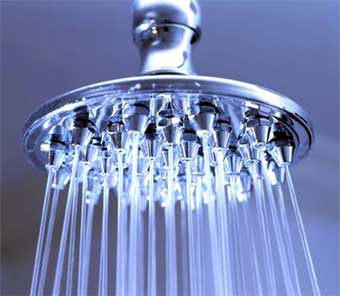
The condition of the water we drink, bathe in, and with which we cook is crucial to our health.
Many people know about the dangers of pathogens or major contaminants in our drinking water, but the voluntary addition of chemicals such as chlorine by local governments can also affect our well being.
Chlorine is used in public water supplies around the country to eliminate pathogens such as viruses and bacteria from our water. Despite the benefits, chemical disinfectants like chlorine can have damaging effects on our bodies.
and bacteria from our water. Despite the benefits, chemical disinfectants like chlorine can have damaging effects on our bodies.
When local governments use chlorine as a water treatment , the chemical combines with natural organic matter to form compounds called trihalomethanes (THMs), also known as disinfectant byproducts. These compounds are toxic when consumed, inhaled, or applied
, the chemical combines with natural organic matter to form compounds called trihalomethanes (THMs), also known as disinfectant byproducts. These compounds are toxic when consumed, inhaled, or applied to the skin and can have lasting negative affects.
to the skin and can have lasting negative affects.
Research conducted on the health effects of chlorinated drinking water demonstrate a variety of toxicity issues.
- Several studies have found that communities using chlorinated or chloraminated drinking water have an increased risk of bladder, kidney, and rectal cancers
 . (Via NIH )
. (Via NIH )
- THMs from chemically treated water have been associated with a variety of poor birth outcomes, such as spontaneous abortion, birth defects, and low birth weight
 . (Via NIH)
. (Via NIH)
- Chlorine and chloramine vapors are associated with greater risk of asthma
 and may damage the mucosal lining of the respiratory tract. (Via Occupational and Environmental Medicine)
and may damage the mucosal lining of the respiratory tract. (Via Occupational and Environmental Medicine)
- Free
 radicals in chlorinated water have been linked to liver malfunction, weakening of the immune system and pre-arteriosclerotic changes in arteries. (Via Orthomolecular)
radicals in chlorinated water have been linked to liver malfunction, weakening of the immune system and pre-arteriosclerotic changes in arteries. (Via Orthomolecular)
The compounds in disinfected water may be able to reach the gut not only through our drinking water, but also through daily showers and baths. A recent post at the Food Renegade blog emphasized this idea, not only highlighting the harmful effects of chlorinated drinking water, but emphasizing the possibly greater effect that showers and baths could have on our intestinal flora . As we know, there’s a strong connection between asthma, acne
. As we know, there’s a strong connection between asthma, acne , autoimmune conditions and the health of our gut flora. With all of this, its fair to think that a microbial imbalance within the body is made worse by all of the chlorine exposure.
, autoimmune conditions and the health of our gut flora. With all of this, its fair to think that a microbial imbalance within the body is made worse by all of the chlorine exposure.
Showering and bathing in chlorinated water may expose us to even more chlorine and its byproducts than drinking disinfected water.
While our bodies can filter out some of the chlorine from our drinking water, the THMs and other disinfectant byproducts we inhale during showers and baths may be much more harmful, since the chlorine gas we inhale enters directly into our blood stream. It’s especially easy for our skin to absorb the chemical as hot showers open up the pores (Via Global Healing Center).
directly into our blood stream. It’s especially easy for our skin to absorb the chemical as hot showers open up the pores (Via Global Healing Center).
Even if you filter your drinking water, the amount of toxins you are exposed to from your daily shower or bath, through inhalation or skin
drinking water, the amount of toxins you are exposed to from your daily shower or bath, through inhalation or skin absorption, may be cause for greater concern.
absorption, may be cause for greater concern.
3 WAYS WATER CAN GIVE YOU RADIANT, YOUTHFUL SKIN
Research has demonstrated that the cancer risk associated with chlorinated water may actually be due to showering and bathing, rather than drinking the disinfected water (Via Oxford Journals). This implies that many of the risks to our health from chlorine and other disinfectants and there byproducts may be related to exposure via inhalation or on the skin, and not limited to solely drinking. A single chloroform dose from a 10-minute shower is equal to, and possibly greater than, that from the average two liters of water ingestion on a daily basis.
chloroform dose from a 10-minute shower is equal to, and possibly greater than, that from the average two liters of water ingestion on a daily basis.
Improving the filtration of your shower and bath is just as important as the water you drink for these reasons.
Chlorine isn’t the only disinfectant of concern for people. Its derivative, chloramine can also cause a lot of harm. Chloramine exposure may be even more damaging to the linings of the lung than chlorine, and may release ammonia as another toxic byproduct as well.
damaging to the linings of the lung than chlorine, and may release ammonia as another toxic byproduct as well.
The filters that remove chlorine don’t necessarily remove chloramine.
Chloramine can be removed for drinking water purposes by our Aura Alkaline Water Filter. This filter can give you the certified healthiest drinking water, free from pollutants such as pathogens, heavy metals, and chlorine.
There are no shower filters on the market that completely remove chloramine. The disadvantage to using them is they’re not as durable or effective as a whole house filtration system, and you would need a separate filter for each shower outlet in the house.
There are, however, whole house water filters that remove chlorine, chloramine, and other contaminants. Our Whole Home Water Conditioner ensures that every drop of your water in your home, is the purest healthiest water on the planet. Works to removes cancer-causing chlorine and other volatile organic compounds from the water in your home.





